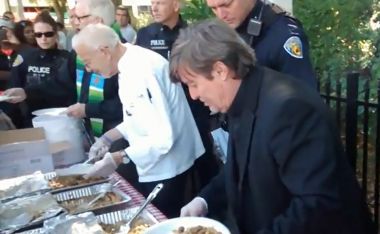Florida pastor detained after feeding homeless: I won't stop

The Florida pastor who was detained with two others for taking part in a food distribution programme for homeless people has said that he has no plans to stop.
Rev Mark Sims of St Mary Magdalene Episcopal Church in Coral Springs, Florida, was charged with Arnold Abbott, 90, and Pastor Dwayne Black of the Sanctuary Church in Fort Lauderdale of violating a new city ordinance aimed at clamping down on food distribution.
The men were not arrested but were told they would have to appear in court.
Asked by TheBlaze website whether they have plans to stop their feeding programme, Sims said "No", noting that his faith was at the heart of his good works. Abbott planned to distribute food yesterday near a local beach.
The distribution was carried out through the Maureen A. Abbott Love Thy Neighbor Fund, set up by Arnold Abbott in 1991 as a "loving, living tribute to his beloved late wife Maureen". Its website says that: "Its purpose has always been to recycle and preserve the integrity of our most precious natural resource: human beings — Broward County's more than 10,000 homeless men, women, and children — helping them to help themselves."
Abbott is no stranger to brushes with authority, having faced arrest before. Love Thy Neighbor has undergone three trials in the Circuit Court and two in the Palm Beach Appeals Court, winning them all and having laws against food distribution declared unconstitutional.
The new legislation under which the three men were most recently detained says that outdoor food programmes must provide a portable toilet, and cannot be within 500 feet of residences. Abbott, whose non-profit has fed over 1,400 people since 1991, said that the portable toilet requirement is a financial burden.
A report last month from America's National Coalition for the Homeless, Share No More: The Criminalization of Efforts to Feed People In Need, says that restrictions by local authorities on food-sharing programmes are based on the "myth" that sharing food encourages homelessness. It says that these are often the only nutritious meals homeless people receive and that it is assumed that if the food-sharing stops, homeless people will simply go away, which it claims is not true.











